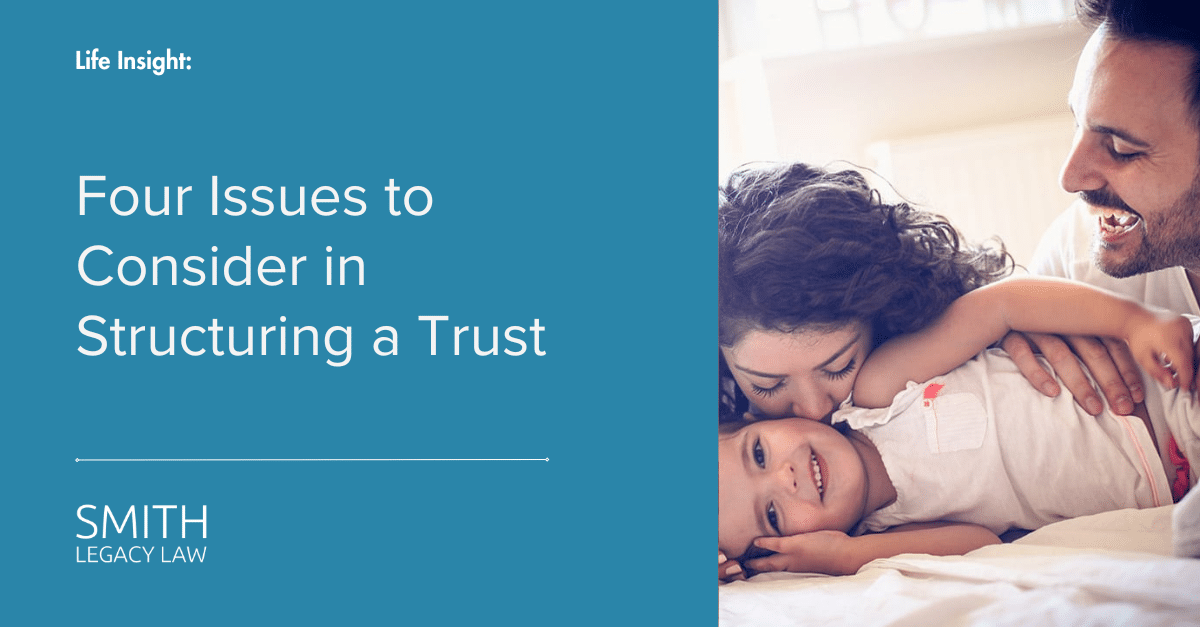Trusts are popular estate planning tools because of their many benefits, but they aren’t appropriate for every situation. Even if a trust is right for you, how you structure the trust can have a significant impact on how well it will help you achieve your objectives. You should get legal advice, but these are some of the issues to consider in structuring a trust:
When Can Beneficiaries Get a Distribution from the Trust?
You can structure the trust to provide for guaranteed or discretionary distributions. Guaranteed distributions are paid out at designated times and in specified amounts. For example, a beneficiary may receive one-third of the trust at ages 25, 30, and 40. Another example would be guaranteed payment of the trust’s net income every year.
Discretionary distributions occur at the discretion of the trustee. However, the trust may establish standards for when the trustee can make a distribution. For instance, the trust may state that the trustee can only pay out funds for the beneficiary’s health, education, maintenance, and support (HEMS).
A caveat of guaranteed distributions is that your beneficiaries may over-rely on getting that money rather than work to support themselves. With discretionary distributions, parents can provide assistance but help ensure children understand they also need to earn a living and contribute to society.
Should You Appoint an Independent Trustee?
Selecting a trustee is an equally important decision, especially if the trust is sizable and will continue for more than one generation. Trustees have fiduciary duties and potential legal liability so you want someone who is responsible and has good judgment. A trustee can be a beneficiary of the trust or be an independent trustee, which is anyone who is not a beneficiary.
The benefit of an independent trustee is that the person or institution is neutral and has no reason to (dis)favor any beneficiaries. However, an independent trustee is typically compensated and fees could be high. If the trust is large and multi-generational, it may be best to appoint a corporate trustee (ex. a bank) because they have experience managing trusts and there is continuity because a corporation doesn’t die (although they could go out of business).
Alternatively, a trustee who is a beneficiary may waive the right to compensation or accept a lower amount, thus reducing the cost of running the trust.
If you plan to give the trustee full discretion to make distributions, then you must appoint an independent trustee to avoid conflicts of interest, adverse tax consequences, and exposure to creditor claims. That’s because if a beneficiary has the power to compel a distribution from the trust, then the IRS and creditors may argue that it isn’t a trust, but instead is the property of the beneficiary. As a result, creditors (or divorcing spouses) can seize the money to pay the beneficiary’s debts.
However, if there is an ascertainable standard for making distributions, such as that payouts can only be made for the beneficiary’s HEMS, an independent trustee is not needed and the beneficiary can also be the trustee. It is important to note that payments for HEMS must be in line with the beneficiary’s lifestyle and standard of living before becoming a current beneficiary. Beneficiaries cannot unilaterally, radically change their lifestyle to get more distributions.
Would You Benefit from a Trust Protector?
Unfortunately, lawsuits by beneficiaries are not uncommon. Appointing a trust protector is one way to reduce the risks of litigation. A trust protector is not a beneficiary or trustee and only has the power to add or remove beneficiaries of the trust. However, this is useful because the trust protector can threaten to remove a beneficiary if they sue the trustee or other beneficiaries without adequate justification.
How Long Do You Want the Trust to Exist?
You may only envision your trust protecting assets for your children until a certain age, or ending the trust once they die, with the remainder distributed to your grandchildren, a charity, or another beneficiary. Alternatively, you may want the trust to continue for multiple generations, which then leads to questions regarding how to allocate shares in the trust or whether to create multiple trusts. We will discuss this topic in more depth in a future post, but it is important to address these issues with an attorney to ensure the trust is designed to meet your wishes.
What Is the Best Way to Structure Your Trust?
There are many more issues to consider than discussed in this post. Trusts can be complicated, which is why it is essential to structure them properly to protect assets and minimize the risks of litigation. Our attorneys have extensive experience drafting trusts and estate plans to help clients leave a lasting legacy for their families. Contact us to discuss your estate planning needs.
